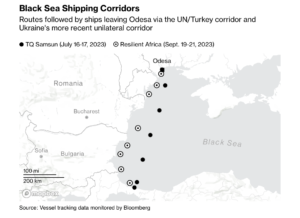As a result of the attack on Iran, nitrogen fertilizer at the port of New Orleans has seen an increase in price this week. Urea prices for barges in New…
Black Sea Humanitarian Grain Corridor Working, Ukraine Says
Reuters writer Pavel Polityuk reported yesterday that, “Ukrainian Deputy Prime Minister Oleksandr Kubrakov denied on Thursday reports by Ukrainian and British firms that the new Black Sea export corridor had been suspended.
“‘The information regarding the cancellation or unscheduled stoppage of the temporary #Ukrainian_corridor for the movement of civilian vessels from and to the ports of the Big Odesa (region) is false,’ Kubrakov said on X, formerly Twitter.
“‘All available routes established by the Ukrainian Navy are valid and being used by civilian vessels.'”
The Reuters article noted that, “The Kyiv-based Barva Invest consultancy, British security firm Ambrey and a specialised outlet, Ukrainian Ports, reported that Ukraine had suspended use of the corridor due to a possible threat from Russian warplanes and sea mines.”
Polityuk pointed out that, “Ukraine launched a ‘humanitarian corridor’ for ships bound for African and Asian markets in August to try to circumvent a de facto blockade in the Black Sea after Russia quit the deal that had guaranteed Kyiv’s seaborne exports during the war.
“Later, a senior agricultural official said the route – which runs along Ukraine’s southwest Black Sea coast, into Romanian territorial waters and onwards to Turkey, would also be used for grain shipments.

“About 700,000 tons of grain have left Ukrainian ports via the new route since it began operating in August. Ukraine shipped up to six million tons of grain a month from its Black Sea ports before Russia’s full-scale invasion in February 2022.”
Dow Jones writer Kirk Maltais reported yesterday that, “Wheat for December delivery rose 1.9% to $5.79 1/2 a bushel on the Chicago Board of Trade on Thursday in response to news, later denied, that Ukraine was shutting down the Black Sea corridor under threat of Russian warplanes and mines.”
Maltais explained that, “Conflicting Signals: Wheat futures reacted to news reports that Ukraine was suspending use of the Black Sea corridor because of the military risks posed by Russia, but Ukraine’s deputy prime minister said the reports were false and that ‘all available routes established by the Ukrainian Navy are valid and being used by civilian vessels.’
“The denial came later in the day after much of the trading had already occurred following a move by market participants to hedge themselves against any Black Sea suspension.”
And a Reuters News article from today reported that, “Ukraine’s grain exports have fallen to 8.72 million metric tons so far in the 2023/24 July-June marketing season, agriculture ministry data showed on Friday.
“The ministry gave no direct comparative data, but said that by Oct. 28 last year Ukraine had exported 12.34 million tons of grain.”
The article added that, “The ministry said 1.97 million tons of grain were exported in the first 26 days of October. Ukraine exported 3.65 million tons from Oct. 1-27 a year ago.
“While the ministry gave no explanation for the decrease, traders and farmers’ unions have said blocked Ukrainian Black Sea ports and Russian attacks on Ukrainian ports on the Danube River are the main reasons for lower exports.
“Ukraine has traditionally shipped most of its exports through its deep water Black Sea ports.”





